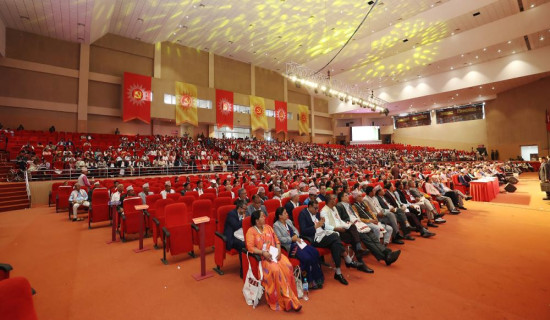- Monday, 8 September 2025
Address Mental Health Issues
Mental health issues impact everyone at some point. Through stress, worry, or more severe issues, our mental health impacts how we live, work, and interact with others. However, when people are at their lowest, there is often no one to help them. The lack of professionals to help those in need means that millions of individuals suffer in silence. According to the World Health Organisation, mental health issues affected 15-20 per cent of Nepal's population in 2019. Nonetheless, the country has fewer than 200 psychiatrists, fewer psychologists, and trained counsellors. Most of them work in major cities, leaving residents in rural villages and small towns with little access to professional care.
Furthermore, they are unable to determine whether it is a mental health issue. Neighbours and villagers begin bullying them even after they are discovered, exacerbating the problem. How society perceives mental wellness is also a problem. Many individuals still believe that suffering from mental illness is a sign of weakness or even negative karma from previous lives. As a result, those who are suffering often remain mute for fear of being judged or rejected by their families and communities. When they do speak up, they are frequently urged to see a religious healer rather than seek medical attention. While spiritual healing can be soothing, it cannot replace professional care when a person is ailing.
Another major concern is education. Few colleges in Nepal provide degrees in psychiatry or psychology, and those that do frequently do not give adequate hands-on training. This means that very few new professionals are joining the field. Many students who wish to become mental health professionals must study overseas, yet the majority do not return, worsening the talent shortage. Furthermore, there is little to no mental health training for general doctors and nurses in Nepal. So, even when patients visit hospitals, their problems are frequently overlooked or neglected.
Mental health is still not a priority in terms of healthcare spending, and there are very few government initiatives dedicated to it. Nepal should invest more in training mental health practitioners, expanding treatment facilities, and making mental health care accessible for all. NGOs and international organisations have attempted to assist by launching awareness campaigns and training programmes, but this alone is insufficient. Nepal needs long-term answers.
So what can we do? First, we need to remove the stigma by normalising the conversations, educating from a young age, using media for awareness, and changing the narrative. A mental problem is not a weakness; it is a part of human life. People should be able to discuss their mental health without fear or shame. Schools should begin teaching pupils about mental health at an early age so that they appreciate its relevance as they get older. Scholarships and incentives should be provided to attract more students to study psychology and psychiatry. Mental health services should also be offered in local health clinics and hospitals. Most significantly, we need to shift our society's perception of mental illness—it is not a weakness but rather a health issue like any other.
Mental health care should not be considered a luxury that only a few can afford; it is a fundamental human right. If we continue to overlook this problem, more people will die from suicide, addiction, and untreated mental diseases. We cannot allow that to happen. The time to act is now. We need more mental health specialists, better services, and a society that listens, supports, and understands people in need. Nobody should have to endure alone.



-original-thumb.jpg)

-(1)-square-thumb.jpg)






-original-thumb.jpg)



